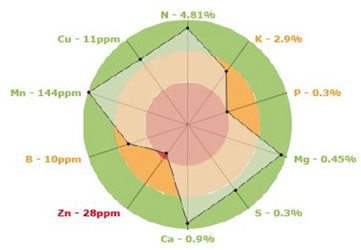Understanding Tissue Sampling
May 10, 2019

Plants have nutritional needs in order to grow and be healthy. In order to find out if your plant is getting fed the proper amount of nutrients, plant tissue sampling can help you identify nutrient deficiencies in the crop.
What can sampling tell us?
A tissue sample analysis provides a grower with a snapshot of the current nutrient levels of a plant, allowing them to determine the best course of action in rectifying nutrient deficiencies. This information can tell you a plant's needs at various growth stages during plant development.
Get to the root of the problem.
As your plants face different conditions their nutritional needs change. By getting a closer look at your plants and soil, NutriSolutions® allows you to make changes in season by measuring what is taken up by the plant.
Using the results.
Tissue sampling can reveal quite a bit, but it should still be considered a piece of the puzzle rather than the while solution. Because many symptoms of distress look the same, it's important to diagnose the right problem before any treatment. Deficiencies of magnesium, sulfur, and zinc, along with lack of sunlight, can all visibly appear the same. Without testing to determine the precise cause, you could waste time and money on solving the wrong problem.
The goal is to apply the optimal amount of inputs. By over-applying (or under-applying) unnecessary nutrients, you're not getting the best return on investment (ROI) possible. If you know the nutrient status of your plant, you can fine-tune a fertilizer application effectively. The end result could be higher yields, increased fiscal profit and overall improved nutrient management program.
NutriSolution® Tissue Sample results gives you solution options to talk through with your West Central Ag Service's agronomist. If you're interested in tissue sampling this season, get in contact with one of your agronomists here!
What can sampling tell us?
A tissue sample analysis provides a grower with a snapshot of the current nutrient levels of a plant, allowing them to determine the best course of action in rectifying nutrient deficiencies. This information can tell you a plant's needs at various growth stages during plant development.
Get to the root of the problem.
As your plants face different conditions their nutritional needs change. By getting a closer look at your plants and soil, NutriSolutions® allows you to make changes in season by measuring what is taken up by the plant.
Using the results.
Tissue sampling can reveal quite a bit, but it should still be considered a piece of the puzzle rather than the while solution. Because many symptoms of distress look the same, it's important to diagnose the right problem before any treatment. Deficiencies of magnesium, sulfur, and zinc, along with lack of sunlight, can all visibly appear the same. Without testing to determine the precise cause, you could waste time and money on solving the wrong problem.
The goal is to apply the optimal amount of inputs. By over-applying (or under-applying) unnecessary nutrients, you're not getting the best return on investment (ROI) possible. If you know the nutrient status of your plant, you can fine-tune a fertilizer application effectively. The end result could be higher yields, increased fiscal profit and overall improved nutrient management program.
NutriSolution® Tissue Sample results gives you solution options to talk through with your West Central Ag Service's agronomist. If you're interested in tissue sampling this season, get in contact with one of your agronomists here!